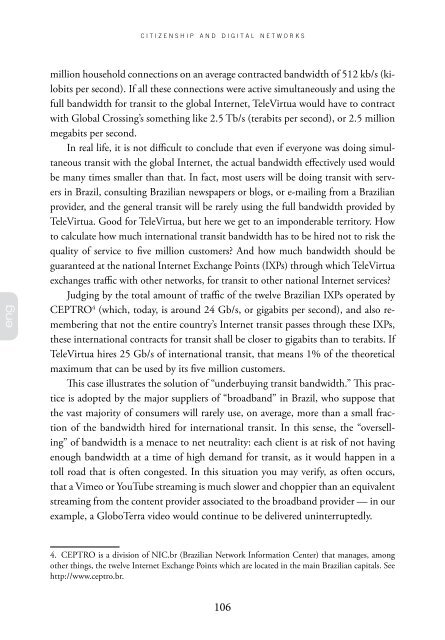Sergio Amadeu da Silveira - Cidadania e Redes Digitais
Sergio Amadeu da Silveira - Cidadania e Redes Digitais
Sergio Amadeu da Silveira - Cidadania e Redes Digitais
You also want an ePaper? Increase the reach of your titles
YUMPU automatically turns print PDFs into web optimized ePapers that Google loves.
eng<br />
c i t i z e n s h i p a n d d i g i t a l n e t w o r k s<br />
million household connections on an average contracted bandwidth of 512 kb/s (kilobits<br />
per second). If all these connections were active simultaneously and using the<br />
full bandwidth for transit to the global Internet, TeleVirtua would have to contract<br />
with Global Crossing’s something like 2.5 Tb/s (terabits per second), or 2.5 million<br />
megabits per second.<br />
In real life, it is not difficult to conclude that even if everyone was doing simultaneous<br />
transit with the global Internet, the actual bandwidth effectively used would<br />
be many times smaller than that. In fact, most users will be doing transit with servers<br />
in Brazil, consulting Brazilian newspapers or blogs, or e-mailing from a Brazilian<br />
provider, and the general transit will be rarely using the full bandwidth provided by<br />
TeleVirtua. Good for TeleVirtua, but here we get to an imponderable territory. How<br />
to calculate how much international transit bandwidth has to be hired not to risk the<br />
quality of service to five million customers? And how much bandwidth should be<br />
guaranteed at the national Internet Exchange Points (IXPs) through which TeleVirtua<br />
exchanges traffic with other networks, for transit to other national Internet services?<br />
Judging by the total amount of traffic of the twelve Brazilian IXPs operated by<br />
CEPTRO 4 (which, to<strong>da</strong>y, is around 24 Gb/s, or gigabits per second), and also remembering<br />
that not the entire country’s Internet transit passes through these IXPs,<br />
these international contracts for transit shall be closer to gigabits than to terabits. If<br />
TeleVirtua hires 25 Gb/s of international transit, that means 1% of the theoretical<br />
maximum that can be used by its five million customers.<br />
This case illustrates the solution of “underbuying transit bandwidth.” This practice<br />
is adopted by the major suppliers of “broadband” in Brazil, who suppose that<br />
the vast majority of consumers will rarely use, on average, more than a small fraction<br />
of the bandwidth hired for international transit. In this sense, the “overselling”<br />
of bandwidth is a menace to net neutrality: each client is at risk of not having<br />
enough bandwidth at a time of high demand for transit, as it would happen in a<br />
toll road that is often congested. In this situation you may verify, as often occurs,<br />
that a Vimeo or YouTube streaming is much slower and choppier than an equivalent<br />
streaming from the content provider associated to the broadband provider — in our<br />
example, a GloboTerra video would continue to be delivered uninterruptedly.<br />
4. CEPTRO is a division of NIC.br (Brazilian Network Information Center) that manages, among<br />
other things, the twelve Internet Exchange Points which are located in the main Brazilian capitals. See<br />
http://www.ceptro.br.<br />
106


